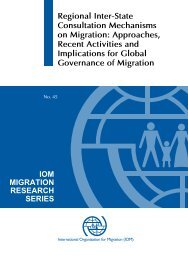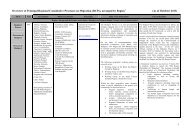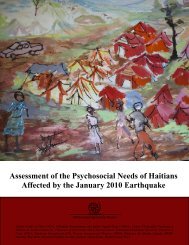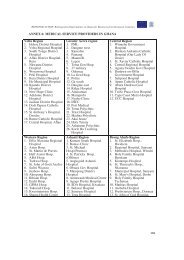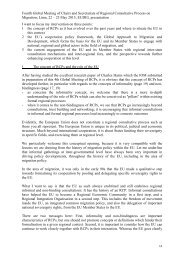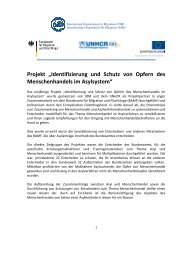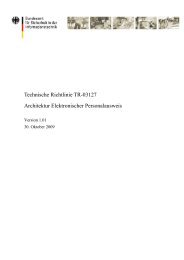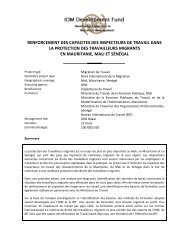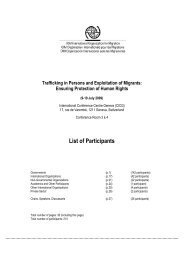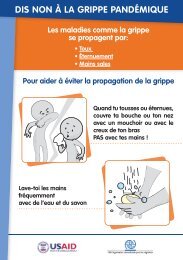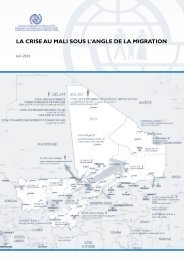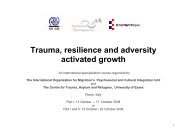iom gender and migration news - International Organization for ...
iom gender and migration news - International Organization for ...
iom gender and migration news - International Organization for ...
You also want an ePaper? Increase the reach of your titles
YUMPU automatically turns print PDFs into web optimized ePapers that Google loves.
1<br />
2<br />
8<br />
10<br />
11<br />
December 2005<br />
Issue N° 24<br />
Inside this Issue<br />
News from HQs<br />
News from the WGGI<br />
News from the Field<br />
Mail <strong>for</strong> Men<br />
Gender Quiz<br />
Food <strong>for</strong> Thought<br />
13 Annex<br />
NEWS FROM HEADQUARTERS<br />
IOM GENDER<br />
AND MIGRATION NEWS<br />
Dear Colleagues,<br />
We approach the end of the year with satisfaction over<br />
this year’s accomplishments, <strong>and</strong> with enthusiasm over next<br />
year’s planned activities.<br />
You will have received by now the long-awaited ‘Guidelines<br />
on Implementing IOM’s Programme <strong>and</strong> Staffing Policy<br />
on Gender Issues’. This is a tool that we hope will provide<br />
guidance to staff, at all levels, to advance <strong>gender</strong> mainstreaming<br />
in the <strong>Organization</strong> while meeting the needs <strong>and</strong> dem<strong>and</strong>s<br />
of stakeholders – governments, migrants, <strong>and</strong> staff.<br />
For a change, this issue reflects more <strong>news</strong> from Headquarters.<br />
We hope you find it interesting <strong>and</strong>, as usual, your<br />
comments are appreciated.<br />
We take this occasion to wish you peace <strong>and</strong> happiness<br />
to you <strong>and</strong> yours <strong>for</strong> 2006.<br />
Working Group on Gender Issues<br />
Apart from the past <strong>and</strong> future activities noted in the WGGI Report to the Council, we are hoping to introduce<br />
timely fact sheets on a number of <strong>gender</strong> issues early in 2006. You will be requested to participate<br />
in the preparation of some of these by providing your own experiences.<br />
Another tool that will be shared with you soon is a publication entitled ‘Guidelines on Gender-Based<br />
Violence Interventions in Emergency Settings: Focusing on Prevention <strong>and</strong> Response to Sexual<br />
Violence’ whose main purpose is to enable communities, governments <strong>and</strong> humanitarian organizations,<br />
including UN agencies <strong>and</strong> NGOs to establish <strong>and</strong> coordinate a set of minimum multi-sectoral<br />
interventions to prevent <strong>and</strong> respond to sexual violence during the early phase of an emergency.<br />
These guidelines are designed <strong>for</strong> use by authorities, personnel <strong>and</strong> organizations operating in emergency<br />
settings at international, national <strong>and</strong> local levels <strong>and</strong> were developed by the IASC Task<strong>for</strong>ce on<br />
Gender <strong>and</strong> Humanitarian Assistance (of which IOM is a member <strong>and</strong> includes several WGGI members)<br />
involving representatives from more than 20 UN <strong>and</strong> NGO entities.<br />
An electronic version of these Guidelines is accessible at: http://www.humanitarianinfo.org/iasc/<strong>gender</strong><br />
But we will communicate more on this soon as we send out the hard copies.<br />
............................................................................. 1
NEWS FROM THE<br />
WGGI<br />
GFP Delbert Field reports:<br />
During the past three-<strong>and</strong>-ahalf<br />
years, IOM's Humanitarian<br />
<strong>and</strong> Social Programmes<br />
(HSP) <strong>for</strong> victims<br />
of the Nazi Holocaust have<br />
helped some 73,220 persons<br />
living in isolation <strong>and</strong> poverty<br />
in Central <strong>and</strong> Eastern<br />
Europe. Programme beneficiaries,<br />
43% of them male <strong>and</strong><br />
57% female, have been<br />
Roma, Jehovah's Witnesses,<br />
disabled <strong>and</strong> homosexuals.<br />
IOM delivered over US$ 32.2<br />
million in assistance consisting<br />
of food, winter aid, hygienic<br />
supplies, clothing, emergency<br />
financial support,<br />
medical care, social support,<br />
legal counseling <strong>and</strong> homecare.<br />
HSP Roma beneficiaries in<br />
Pskov, Russia, November 2004<br />
* * *<br />
GFP Shabnam Mossaheb<br />
writes:<br />
Early this year, I received an<br />
article from a colleague about<br />
a statement made by the<br />
President of Harvard Univer-<br />
sity in January 2005 suggesting<br />
that women had less innate<br />
ability at science <strong>and</strong><br />
math than men. Having been<br />
amongst the top 5 students<br />
having passed the science<br />
<strong>and</strong> math annual exam in my<br />
country, I was shocked by the<br />
statement made by Dr. Summers<br />
<strong>and</strong> his further claims<br />
that, according to his theory,<br />
men were more naturally able<br />
at science <strong>and</strong> that this was<br />
based on research, not his<br />
own opinions - although no<br />
in<strong>for</strong>mation was provided in<br />
the article as to what type of<br />
research was carried out to<br />
reach such a conclusion. I<br />
thought at length about this<br />
statement <strong>and</strong> the more I<br />
thought, the more I believed<br />
that if women had not managed<br />
to be well represented<br />
among the senior academics<br />
in science <strong>and</strong> math, it was<br />
not because of their low innate<br />
ability (as suggested by<br />
the President of Harvard<br />
University), rather it was because<br />
of the social <strong>and</strong> educational<br />
norms that are not very<br />
encouraging <strong>for</strong> women. Furthermore,<br />
it seems to me that<br />
fewer opportunities are being<br />
offered to women in senior<br />
academic <strong>and</strong> research positions.<br />
While still pondering this issue,<br />
I received another article,<br />
this time about 'the culture<br />
of machismo' in certain<br />
courses. In a way, it was a<br />
confirmation of my beliefs<br />
<strong>and</strong> I thought I would share it<br />
with all of you who might<br />
have also read the statement<br />
of Dr. Summers in case you<br />
were also looking <strong>for</strong> a<br />
counter opinion.<br />
By Sean Coughlan - BBC<br />
News Education 28/02/2005<br />
“MBAs 'must drop the machismo'<br />
The MBA business degree,<br />
once an icon of the bracessnapping<br />
1980s, is in danger<br />
of becoming a sexist dinosaur,<br />
say university researchers.<br />
An emblem of the era when<br />
"lunch was <strong>for</strong> wimps" has<br />
been accused of being too aggressively<br />
macho. The study<br />
by the Brunel University Business<br />
School says MBA courses<br />
need to be "feminised". Instead<br />
of tough-guy table-thumping,<br />
managers needed to develop<br />
"soft skills", say the researchers.<br />
The study says that the<br />
MBA - Master of Business<br />
Administration - was described<br />
by one female student<br />
as st<strong>and</strong>ing <strong>for</strong> "Mighty Big<br />
Attitude".<br />
'Over-confident'<br />
The courses were accused of<br />
promoting a culture of "aggressive<br />
<strong>and</strong> over-confident<br />
attitudes". And these boastful,<br />
bloke-ish David Brents with<br />
qualifications were not recognising<br />
that different skills were<br />
now needed <strong>for</strong> the workplace.<br />
"Despite women being over<br />
50% of Britain's population<br />
<strong>and</strong> almost 50% the work<strong>for</strong>ce,<br />
current courses frequently<br />
reflect <strong>and</strong> reproduce<br />
values associated with masculinity,"<br />
says the study from<br />
Brunel University. These masculine<br />
attitudes were about<br />
"power <strong>and</strong> control", while the<br />
report recommends that modern<br />
workplaces needed skills<br />
such as "listening, trust build-<br />
............................................................................. 2
ing skills <strong>and</strong> adaptability".<br />
MBA courses needed to "address<br />
the modern, increasingly<br />
female, environment",<br />
said Ruth Simpson of Brunel<br />
University's Business School.<br />
"In today's diverse workplace,<br />
the 'hard' skills, which<br />
have served managers well in<br />
the past, must be added to a<br />
greater focus on 'softer', perhaps<br />
more feminine skills,"<br />
she said. "MBA programmes<br />
need to provide opportunities<br />
<strong>for</strong> developing emotional intelligence<br />
<strong>and</strong> building better<br />
team working, communication<br />
<strong>and</strong> leadership skills."<br />
Business <strong>and</strong> management<br />
courses, although long the<br />
butt of jokes about clichéd<br />
language <strong>and</strong> dubious motivational<br />
theories, have continued<br />
to attract students, <strong>and</strong><br />
are often among the most<br />
popular <strong>for</strong> applications <strong>for</strong><br />
undergraduate <strong>and</strong> graduate<br />
degrees. Last month, there<br />
was a <strong>for</strong>ecast that another<br />
12,000 business courses<br />
would need to open in higher<br />
education institutions across<br />
Europe to meet the growing<br />
dem<strong>and</strong>.”<br />
WGGI Head Denise<br />
Glasscock reports:<br />
In the last issue of this Bulletin,<br />
I had highlighted the objectives<br />
of the Conference <strong>for</strong> Women<br />
Leaders on ‘Migration <strong>and</strong><br />
Gender Issues within the Millennium<br />
Development Goals’<br />
that was organized by IOM in<br />
cooperation with the MASHAV<br />
Centre <strong>for</strong> <strong>International</strong> Cooperation,<br />
the Golda Meir Mount<br />
Carmel <strong>International</strong> Training<br />
Centre (MCTC) <strong>and</strong> the Centre<br />
<strong>for</strong> <strong>International</strong> Migration <strong>and</strong><br />
Integration (CIMI) in Haifa,<br />
Israel from 25-28 September.<br />
Hereafter is the preliminary report:<br />
The Conference gathered over<br />
20 Ministers <strong>and</strong> parliamentarians,<br />
Heads of Agencies, academics,<br />
<strong>and</strong> NGO representatives.<br />
The Guest of honour was<br />
Ms. Rachel Mayanja, United<br />
Nations Assistant Secretary-<br />
General <strong>and</strong> Special Advisor to<br />
the UN Secretary General on<br />
Gender Issues <strong>and</strong> the Advancement<br />
of Women.<br />
At the Official Opening, the<br />
Conference Chair, Hon. Ndioro<br />
Ndiaye, Minister & Deputy-<br />
Director General of IOM gave<br />
a welcome speech, in addition<br />
to delivering the Keynote Address,<br />
which set out some of<br />
the salient points in the context<br />
of <strong>gender</strong> <strong>and</strong> <strong>migration</strong> <strong>and</strong><br />
included the fact that:<br />
The specific aspects of women’s<br />
<strong>migration</strong> are not dealt with<br />
separately, but are treated in<br />
the general context, which detracts<br />
from the implementation<br />
of political, legislative <strong>and</strong><br />
regulatory measures aimed<br />
specifically at guaranteeing the<br />
empowerment of migrant<br />
women.<br />
Plenary Sessions began on<br />
Monday, 26 September, in the<br />
<strong>for</strong>m of panel presentations by<br />
expert speakers, followed by<br />
questions, answers <strong>and</strong> general<br />
discussion from the floor. Many<br />
presentations were delivered<br />
with the aid of powerpoint<br />
transparencies, which were duplicated<br />
<strong>for</strong> distribution. Participants<br />
spoke in English,<br />
French or Spanish, <strong>and</strong> simultaneous<br />
interpretation was provided<br />
in all the Plenary Sessions.<br />
Be<strong>for</strong>e the expert presentations<br />
on Monday morning the<br />
Plenary was privileged to hear a<br />
Statement from Ms Rachel Mayanja.<br />
She acknowledged the<br />
rapid increase in migratory<br />
movement, accelerating recognition<br />
of <strong>migration</strong> as an element<br />
of social development <strong>and</strong> -<br />
through remittances - economic<br />
development too. She reminded<br />
the plenary that: “When women<br />
thrive, all of society benefits <strong>and</strong><br />
succeeding generations are given<br />
a better start in life”.<br />
Plenary Session I then discussed<br />
The Role of Women in Achieving<br />
the Millennium Development<br />
Goal. Hon. Marie Josée Jacobs<br />
of Luxembourg, Minister of<br />
Family, Integration <strong>and</strong> Equal<br />
Opportunities, was in the Chair.<br />
She spoke of the commitment<br />
made by the European Union to<br />
the Beijing Plat<strong>for</strong>m of Action,<br />
which closely aligns with the<br />
MDGs.<br />
Expert presentations were given<br />
on Gender, Poverty Reduction<br />
<strong>and</strong> Migration by Ms. Irena<br />
Omelaniuk, Migration Adviser,<br />
Development Economic Prospects<br />
Group, The World Bank;<br />
The Empowerment Process<br />
through Migration <strong>and</strong> Integration<br />
by Ms. Erica Usher, Head,<br />
Strategic Policy <strong>and</strong> Planning,<br />
Migration Policy, Research <strong>and</strong><br />
Communications, IOM; Migrant<br />
Women as Role Models <strong>for</strong> Future<br />
Generations, by Dr. Muneera<br />
Salem-Murdock, Senior<br />
Development Policy Advisor,<br />
U.S. Executive Director’s Office,<br />
The World Bank. Prof. Yuli<br />
Tamir, Member of the Israeli<br />
Knesset, spoke on Women’s Participation<br />
in the Decision-Making<br />
Process .<br />
Comments <strong>and</strong> questions were<br />
offered by representatives of<br />
Finl<strong>and</strong>, Canada, Portugal, Costa<br />
Rica, Paraguay, Nepal, Georgia<br />
<strong>and</strong> Congo. As these include both<br />
countries of origin <strong>and</strong> countries<br />
............................................................................. 3
of destination <strong>for</strong> women who<br />
migrate, quite differing viewpoints<br />
<strong>and</strong> opinions were expressed<br />
on the presentations.<br />
Plenary Session II, on Obstacles<br />
<strong>and</strong> Challenges faced by<br />
Migrant Women, was chaired<br />
by the Hon. Kumari Selja,<br />
Minister <strong>for</strong> Urban Employment<br />
<strong>and</strong> Poverty Alleviation,<br />
India, who gave a presentation<br />
on the situation of migrant<br />
women in India.<br />
The first panelist, Ms. Bineta<br />
Diop, represented the NGO<br />
Femmes Africa Solidarité<br />
(FAS) <strong>and</strong> she spoke on Gender<br />
Based Violence within Migration.<br />
She was followed by the<br />
IOM Legal Officer, Ms. Jillyanne<br />
Redpath, speaking on<br />
Human Rights of Migrants –<br />
Women’s Rights in Particular.<br />
An Israeli academic, Prof.<br />
Larissa Remennick, from Bar-<br />
Ilan University lectured on Immigrant<br />
Women from the Former<br />
Soviet Union in Israel.<br />
In questions <strong>and</strong> comments<br />
from delegates representing<br />
Portugal, Cameroon, Finl<strong>and</strong>,<br />
Mexico, Croatia, Uruguay,<br />
Zambia, Georgia, the Republic<br />
of Central Africa <strong>and</strong> Canada,<br />
the movement of skilled workers<br />
was considered more, as was<br />
the place the media might play<br />
in publicizing <strong>migration</strong> problems.<br />
The role of <strong>and</strong> need to<br />
address conflicts was also<br />
raised.<br />
The Conference participants<br />
were able to choose their activity<br />
in the afternoon, deciding<br />
between a study tour or participation<br />
in a workshop. The<br />
workshops discussed two topics<br />
– the first – How Women can<br />
be Empowered by Migration -<br />
Microfinance/micro-credits <strong>and</strong><br />
Female Entrepreneurs, relating<br />
to the content of Plenary Ses-<br />
sion I was chaired by Hon.<br />
Diane Vincent of CIDA, <strong>and</strong><br />
the second, relating to Plenary<br />
Session II, Increased Vulnerability<br />
of Women during Migration<br />
– Health Issues of Mobile<br />
Populations was chaired by<br />
Hon. Dr. Asha- Rose Mgiro,<br />
Minister <strong>for</strong> Development of<br />
Society, Women <strong>and</strong> Children,<br />
Tanzania.<br />
The study tours illustrated<br />
Practices in coping with challenges<br />
facing migrant women –<br />
the community approach or Entrepreneurship<br />
<strong>and</strong> Employment<br />
<strong>for</strong> Migrant Women –<br />
small business development.<br />
The Plenary gathered together<br />
again, chaired by Hon. Dr.<br />
Maryam Ciroma, Minister <strong>for</strong><br />
Women’s Affairs <strong>and</strong> Youth<br />
Development, Nigeria, to hear<br />
reports from the study visits <strong>and</strong><br />
the conclusions which had been<br />
drawn from the workshop discussions.<br />
Hon. Diane Vincent,<br />
reported on the deliberations of<br />
Workshop 1 <strong>and</strong> Ms. R<strong>and</strong>i<br />
Garber of CIMI on Workshop<br />
2.<br />
On Tuesday 27 September Plenary<br />
Session III dealt with the<br />
phenomenon of Trafficking in<br />
Women: root causes <strong>and</strong> best<br />
practices in prevention <strong>and</strong><br />
protection, return <strong>and</strong> reintegration.<br />
In the Chair was Hon.<br />
Maria Rauch-Kallat, Federal<br />
Minister <strong>for</strong> Health <strong>and</strong><br />
Women’s Issues, Austria.<br />
The expert Panel Presentations<br />
concerned The Major Trafficking<br />
Trends, by Ms. Kristiina<br />
Kangaspunta,Officer-in-Charge,<br />
Anti-human Trafficking Unit,<br />
United Nations Office on Drugs<br />
<strong>and</strong> Crime, UNODC; Combating<br />
Trafficking of Women in<br />
Israel, Ms. Zahava Galon,<br />
Member of Knesset, Chair, Parliamentary<br />
Committee of In-<br />
quiry into the Trafficking in<br />
Women <strong>and</strong> Basic Principles to<br />
Assist Victims of Trafficking, explained<br />
by Ms. Theodora Suter,<br />
Programme Officer, IOM.<br />
The very lively question, answer<br />
<strong>and</strong> discussion period that followed<br />
exp<strong>and</strong>ed on many of the<br />
points raised by the speakers <strong>and</strong><br />
touched on others such as trafficking<br />
in human organs.<br />
The fourth Plenary Session was<br />
devoted to Diasporas <strong>and</strong> Development<br />
– <strong>gender</strong> related<br />
trends in personal <strong>and</strong> community<br />
remittances. In the Chair<br />
was Hon. Nicacia Vda. De<br />
Solaeche, Minister <strong>for</strong> Development,<br />
Repatriation <strong>and</strong><br />
Refugees, Paraguay.<br />
The expert Presentations were:<br />
Review of Current Gaps in Research<br />
on Remittances <strong>and</strong> Gender<br />
by Amb. Carmen Moreno,<br />
Director, United Nations <strong>International</strong><br />
Research & Training Institute<br />
<strong>for</strong> the Advancement of<br />
Women, INSTRAW, The Emerging<br />
Economic <strong>and</strong> Social Role of<br />
the Diaspora: Canada’s Experience,<br />
by Hon. Diane Vincent,<br />
Executive Vice-President, Canadian<br />
<strong>International</strong> Development<br />
Agency (CIDA), The Role of Migrant/Community<br />
Associations in<br />
Development by Mr. Chukwu–<br />
Emeka Chikezie, Executive Director,<br />
African Foundation <strong>for</strong><br />
Development (AFFORD) <strong>and</strong><br />
finally, Shifting Power – Diaspora<br />
women taking a lead in<br />
community development: American<br />
Jewish women <strong>and</strong> Israel, by<br />
Ms. Rebecca Caspi, Executive<br />
Director, World-wide Human<br />
Resources, American Joint Jewish<br />
Distribution Committee<br />
(AJJDC).<br />
Workshops in language groups<br />
gave the opportunity <strong>for</strong> closer<br />
analysis of the subjects that had<br />
been under discussion during<br />
............................................................................. 4
plenary sessions III <strong>and</strong> IV. The<br />
groups looking at The Influence<br />
of Women of the Diasporas on<br />
Development in Countries of<br />
Origin were presided over by<br />
Hon. Ellen Gracie Northfleet<br />
of Brazil <strong>and</strong> Hon. Mme<br />
Ndioro Ndaye of IOM. Hon.<br />
Suzanne Bomback of Cameroon,<br />
Hon. Ana Marina Arismendi<br />
Dubinsky of Uruguay<br />
<strong>and</strong> Ms. Rachel Gershuni of<br />
Israel chaired the groups on<br />
Promoting Female Migration in<br />
a Positive Protection Climate.<br />
Conclusions from these workshops<br />
were reported back to the<br />
plenary in a session chaired by<br />
Hon. Sylvia Masebo of Zambia.<br />
Dr. Elisabeth Rehn, Former<br />
Minister of Defence & Equality<br />
Affairs, Finl<strong>and</strong>, then<br />
chaired a Special Session <strong>for</strong><br />
Ministers’ Statements, when<br />
Ministers <strong>and</strong> Deputy-<br />
Ministers from Nigeria, Cameroon,<br />
the Central African<br />
Republic, Tanzania, Romania,<br />
Zambia, Congo, <strong>and</strong> Croatia<br />
expressed their opinions on the<br />
topic of the Conference.<br />
In a final session, the Chair, Dr.<br />
Magdalena Sroda, Minister<br />
<strong>for</strong> Women’s Affairs, Pol<strong>and</strong>,<br />
summarized the content of the<br />
proceedings, making a plea <strong>for</strong><br />
greater tolerance <strong>and</strong> better education.<br />
She called <strong>for</strong> presentation<br />
of the CONFERENCE<br />
CONCLUSIONS AND REC-<br />
OMMENDATIONS, which<br />
had been drawn up based on<br />
much of what had been repeatedly<br />
said in debate <strong>and</strong> discussion<br />
in the two <strong>and</strong> a half intensive<br />
days. With some very minor<br />
adjustments, they were<br />
unanimously accepted by the<br />
Plenary, <strong>and</strong> called upon:<br />
1. The UN Special Advisor<br />
on Gender <strong>and</strong> Advancement<br />
of Women to bring these<br />
conclusions <strong>and</strong> recommendations<br />
<strong>and</strong> the report of this conference<br />
to the attention of the<br />
High Level Dialogue of the<br />
General Assembly in June,<br />
2006 with the aim of advancing<br />
the <strong>migration</strong> <strong>and</strong> <strong>gender</strong><br />
issues within the context of the<br />
debate on the MDGs;<br />
2. Governments, recognizing<br />
that they are countries of<br />
origin, transit <strong>and</strong> destination,<br />
to ensure that <strong>migration</strong> <strong>and</strong><br />
<strong>gender</strong> issues are incorporated<br />
within their Poverty Reduction<br />
Strategy Papers (PRSPs) to assist<br />
them in attaining the<br />
MDGs;<br />
3. <strong>International</strong> agencies<br />
<strong>and</strong> governments to collect <strong>and</strong><br />
analyse sex disaggregated statistics<br />
on <strong>migration</strong>, diasporas<br />
<strong>and</strong> remittances;<br />
4. <strong>International</strong> agencies<br />
<strong>and</strong> governments to examine<br />
the impacts of trafficking in<br />
persons on poverty <strong>and</strong> on the<br />
achievement of PRSPs, <strong>for</strong> example<br />
the potential loss of remittances<br />
<strong>for</strong> poor families of<br />
trafficked victims;<br />
5. Governments to give<br />
consideration to ratification of<br />
international instruments promoting<br />
the rights of female<br />
migrants <strong>and</strong> enact legislation<br />
giving effect to those rights;<br />
6. <strong>International</strong> <strong>and</strong> national<br />
development agencies to<br />
consider <strong>migration</strong> <strong>and</strong> <strong>gender</strong><br />
in the planning, implementation<br />
<strong>and</strong> evaluation of their development<br />
strategies;<br />
7. Donor <strong>and</strong> recipient<br />
countries to create channels <strong>for</strong><br />
women leaders in diasporas,<br />
<strong>and</strong> subsequent generations, to<br />
be partners in development<br />
planning <strong>and</strong> programming;<br />
<strong>and</strong> to actively support migrant<br />
women in diaspora communities<br />
to engage in development ef<strong>for</strong>ts<br />
through their skills, knowledge<br />
<strong>and</strong> experience; <strong>and</strong> to engage<br />
subsequent generations;<br />
8. Governments to foster<br />
sensitivity towards the cultures<br />
of migrants, but in doing so,<br />
ensure that all cultural <strong>and</strong> customary<br />
practices that negatively<br />
affect the rights of women (e.g<br />
female genital mutilation) are<br />
eliminated, including through<br />
specific legislation;<br />
9. Governments to adopt a<br />
rights-based approach to the<br />
management of <strong>migration</strong>,<br />
promoting policies <strong>and</strong> programmes<br />
responsive to the<br />
needs of female migrants;<br />
10. Governments to develop<br />
practical means to enable interagency<br />
cooperation on <strong>migration</strong>,<br />
<strong>gender</strong> <strong>and</strong> development<br />
within their own ranks;<br />
11. Governments to foster<br />
regional <strong>and</strong> international cooperation<br />
between governments<br />
in <strong>migration</strong> issues with consideration<br />
given to the special<br />
needs of female migrants;<br />
12. Governments to foster<br />
cooperation on <strong>migration</strong>, <strong>gender</strong><br />
<strong>and</strong> development issues<br />
among governments (including<br />
local governments), civil society,<br />
trade unions, diaspora organizations,<br />
private sector, research<br />
institutions <strong>and</strong> international<br />
organizations;<br />
13. The media to provide a<br />
fair, balanced <strong>and</strong> respectful<br />
image of female migrants;<br />
14. Governments to ensure<br />
access to necessary health services;<br />
15. Governments to promote<br />
the integration of female mi-<br />
............................................................................. 5
grants <strong>and</strong> members of their<br />
families, including taking<br />
measures to eradicate discrimination,<br />
intolerance <strong>and</strong><br />
stereo typing.<br />
To further the above recommendations,<br />
specific actions<br />
should include:<br />
1. Gendered profile studies on<br />
diasporas in countries of destination;<br />
2. Gendered household surveys<br />
of the beneficiaries of remittances<br />
in countries of origin;<br />
3. Activities in partnership between<br />
origin <strong>and</strong> destination<br />
countries to engage women<br />
diaspora leaders in the planning<br />
<strong>and</strong> execution of development<br />
programmes, which<br />
will contribute to global poverty<br />
reduction;<br />
4. Research studies to examine<br />
the impact on family <strong>and</strong> society<br />
of changes in <strong>gender</strong><br />
roles resulting from female<br />
<strong>migration</strong>;<br />
5. Sharing of knowledge <strong>and</strong><br />
in<strong>for</strong>mation among countries<br />
of origin <strong>and</strong> destination on<br />
best practices related to <strong>gender</strong>,<br />
<strong>migration</strong> <strong>and</strong> development<br />
issues, utilizing existing<br />
dialogue <strong>for</strong>a.<br />
Note: A picture of all participants<br />
can be found on the last<br />
page.<br />
* * *<br />
Denise also wrote:<br />
On 20 October, the WGGI<br />
participated in the organization<br />
of a half-day workshop,<br />
sponsored by the Staff Association<br />
Committee <strong>and</strong> in cooperation<br />
with Staff Development<br />
<strong>and</strong> Learning, on<br />
‘Gender Differences in the<br />
Relations between Men <strong>and</strong><br />
Women in the Work Place’ in<br />
October. The programme<br />
dealt with: 1) Gender differences<br />
at work (how men <strong>and</strong><br />
women see themselves in the<br />
work place; what is important<br />
<strong>for</strong> men is not necessarily<br />
important <strong>for</strong> women <strong>and</strong><br />
vice versa); 2) How to work<br />
with the opposite sex (teamwork,<br />
how to manage the opposite<br />
sex; most common<br />
mistakes); <strong>and</strong> 3) How to<br />
solve problems together (argument<br />
<strong>for</strong> argument sake,<br />
problem solving, working<br />
together in stressful working<br />
environments).<br />
* * *<br />
In November, a film on Female<br />
Genital Mutilation<br />
(‘The Razor’s Edge’ produced<br />
by IRIN-OCHA) was<br />
aired on the first day of the<br />
international campaign of 16<br />
Days of Activism Against<br />
Gender Violence. Following<br />
the projection of the film, an<br />
interesting debate ensued<br />
among interested staff <strong>and</strong><br />
will be followed up by the<br />
projection of other films. The<br />
WGGI was extremely<br />
pleased to note that 5 male<br />
staff members attended the<br />
session.<br />
* * *<br />
GFP Dina Ionescu reports:<br />
« Les femmes immigrées et<br />
le marché du travail : diversité<br />
et enjeux »<br />
Aperçu du séminaire de<br />
l’OCDE et de la Commission<br />
européenne à Bruxelles,<br />
26 - 27 septembre<br />
Les pays de l’OCDE doivent<br />
faire face à un paradoxe : alors<br />
que les femmes immigrées ont<br />
un niveau d’éducation supérieure<br />
plus élevé que celui des<br />
femmes nées dans le pays<br />
d’accueil, elles sont surreprésentées<br />
dans des emplois peu<br />
qualifiés. Leur taux de chômage<br />
est élevé comparé à celui<br />
des femmes nées dans le pays<br />
et les femmes arrivées récemment<br />
sont souvent surqualifiées<br />
par rapport aux postes<br />
qu’elles occupent.<br />
Les causes peuvent être multiples<br />
: la langue, les différences<br />
culturelles, l’accès à<br />
l’in<strong>for</strong>mation, la non reconnaissance<br />
des diplômes, aussi<br />
bien que les systèmes de garde<br />
d’enfants ou des phénomènes<br />
d’auto exclusion. Les pratiques<br />
discriminatoires sur le marché<br />
du travail existent et peuvent<br />
être confirmées par des résultats<br />
défavorables des enfants<br />
issus de l’im<strong>migration</strong> sur le<br />
marché du travail, même si ces<br />
derniers ont été élevés et éduqués<br />
dans le pays d'accueil.<br />
Cependant la participation des<br />
femmes immigrées dans les<br />
pays d'accueil tend à être en<br />
général plus importante qu’elle<br />
ne l’est dans leurs pays<br />
d’origine respectifs, un résultat<br />
qui peut être interprété à la fois<br />
positivement et négativement.<br />
L’accès au marché du travail<br />
par les femmes migrantes est<br />
donc à la croisée des questions<br />
migratoires, sociales et de<br />
genre.<br />
L’OIM a été présente dans ce<br />
séminaire, sur le thème des<br />
« Stratégies de Pré départ visant<br />
les femmes migrantes », à<br />
............................................................................. 6
travers la division de la Recherche.<br />
L’objectif était<br />
d’offrir quelques enseignements<br />
à transposer au niveau<br />
des politiques, à partir de<br />
l’expérience acquise dans des<br />
programmes développés par<br />
l’organisation, tels : Pologne<br />
- Pays Bas : « Développer les<br />
compétences des Infirmières<br />
Polonaises » ; Sri Lanka -<br />
Italie : « Sélection, <strong>for</strong>mation<br />
et insertion dans le marché du<br />
travail pour des assistants à<br />
domicile » ; Philippines :<br />
« Le Pouvoir de Choisir »;<br />
Bangladesh : « Programmes<br />
de pré-départ pour les femmes<br />
migrantes » etc.<br />
La question des femmes migrantes<br />
se pose à travers ces<br />
programmes à plusieurs niveaux:<br />
sectoriel (secteurs où<br />
main d’œuvre féminine migrante<br />
concentrée) ; de promotion<br />
des femmes (accès à<br />
l’éducation, <strong>for</strong>mation et in<strong>for</strong>mation)<br />
; de maximisation<br />
des bénéfices de la <strong>migration</strong><br />
pour tous ; d’amélioration de<br />
l’image des femmes migrantes<br />
et de protection.<br />
A partir de l’expérience<br />
concrète de ces programmes,<br />
plusieurs recomm<strong>and</strong>ations<br />
peuvent être <strong>for</strong>mulées :<br />
• L’in<strong>for</strong>mation et la <strong>for</strong>mation<br />
sont des éléments<br />
essentiels pour une <strong>migration</strong><br />
réussie ;<br />
• La méconnaissance de la<br />
langue et des procédures<br />
et réglementations du<br />
pays d’accueil sont un<br />
facteur principal d’échec ;<br />
• La non reconnaissance de<br />
diplômes reste un problème<br />
significatif pour le<br />
recrutement à un niveau<br />
des compétences approprié<br />
;<br />
• Le coût social de la <strong>migration</strong><br />
se pose de façon<br />
aigue dès que l’on parle<br />
de <strong>migration</strong> des femmes<br />
;<br />
• Une nouvelle génération<br />
de programmes est à développer<br />
qui comporte<br />
des assurances sociales,<br />
familiales ou parentales et<br />
qui aide les femmes à<br />
partir de façon autonome<br />
et in<strong>for</strong>mée ;<br />
• Privilégier une dimension<br />
« genre » plutôt<br />
que « femmes » aide à<br />
mieux comprendre des<br />
enjeux tels la dem<strong>and</strong>e de<br />
main d’œuvre immigrée<br />
sexo-spécifique, la diversification<br />
des occupations,<br />
l’évolution des métiers<br />
et l’impact des <strong>migration</strong>s<br />
sur les familles.<br />
-<br />
Cette note est établie à partir<br />
des Conclusions de Berglind<br />
Ásgeirsdóttir, Secrétaire général<br />
adjoint de l’OCDE et<br />
de la présentation « Stratégies<br />
de Pré départ visant les<br />
femmes migrantes » préparée<br />
par Dina Ionescu.<br />
* * *<br />
GFP Yagana T<strong>and</strong>ja writes:<br />
La fistule obstétricale<br />
au Niger<br />
La fistule obstétricale (FO)<br />
est l’une des innombrables<br />
violences sexuelles que subissent<br />
encore les femmes<br />
dans les PMA et l’OMS estime<br />
aujourd’hui le nombre<br />
de femmes et jeunes filles<br />
touchées par la fistule dans<br />
ces pays, à environ deux mil-<br />
lions et ce nombre augmente<br />
de 50 000 à 100 000 par an.<br />
Dans les régions où la mortalité<br />
maternelle est élevée, le<br />
taux de fistule peut atteindre<br />
deux ou trois cas pour 1 000<br />
grossesses.<br />
La FO est une conséquence<br />
directe de l’accouchement<br />
après un long travail anténatal<br />
aggravé par l’absence de soins<br />
obstétricaux adéquats chez la<br />
jeune fille (15 ans en<br />
moyenne) et se caractérise par<br />
un trou (résultant d’une rupture<br />
des tissus) entre le vagin<br />
et la vessie ou, dans certains<br />
cas, le rectum, provoquant ainsi<br />
une incontinence permanente.<br />
Très souvent, la femme<br />
accouche d’un mort-né.<br />
Cette pathologie est également<br />
caractérisée par une situation<br />
dégradante et humiliante pour<br />
ces femmes atteintes car elles<br />
dégagent constamment une<br />
odeur d’urine ou<br />
d’excréments. Elles se retrouvent<br />
finalement en marge de la<br />
société, ab<strong>and</strong>onnées par leur<br />
mari et leur famille.<br />
Au Niger, pays de l’Afrique de<br />
l’Ouest, cette problématique<br />
subsiste et jusqu’en 2004, la<br />
prévalence réelle de la fistule<br />
obstétricale ainsi que le nombre<br />
exact des femmes traitées<br />
au Niger restaient méconnus.<br />
L’insuffisance et<br />
l’éloignement de structures<br />
sanitaires adéquates, la pauvreté,<br />
et l’analphabétisme expliquent<br />
que 75% des femmes<br />
n’ont pas un accès approprié à<br />
un service de santé de la reproduction.<br />
Il faut également<br />
rajouter à ce tableau, le rôle du<br />
mariage précoce (15 ans pour<br />
les filles) et un <strong>for</strong>t taux de<br />
............................................................................. 7
fécondité (le plus élevé au<br />
monde). Dans ce pays, seules<br />
30% des femmes bénéficient<br />
de soins anténataux et<br />
dans le milieu rural, les accouchements<br />
se font à domicile<br />
selon des pratiques traditionnelles<br />
néfastes dans une<br />
majorité des cas.<br />
Fort de ce constat, l’ONG<br />
nigérienne « Action Stop<br />
H<strong>and</strong>icap » 1 , à l’image de<br />
plusieurs initiatives existant<br />
dans le pays, s’est penchée<br />
sur cette douloureuse question<br />
en 2003. En partenariat<br />
avec UNFPA, le gouvernement<br />
nigérien et autres acteurs<br />
sur la place, ASH a<br />
donc entrepris une campagne<br />
d’in<strong>for</strong>mation suivie par<br />
l’organisation d’un concert,<br />
dont les fonds devaient servir<br />
à la construction d’un centre<br />
de réinsertion sociale des filles<br />
et femmes h<strong>and</strong>icapées<br />
par la FO dans le département<br />
de Tahoua (région<br />
charnière entre l’Est et<br />
l’Ouest du pays). Une fois<br />
prises en charge et guéries<br />
physiquement à l’hôpital National<br />
de Niamey, ce centre<br />
leur permettrait de prendre le<br />
temps de se reconstruire psychologiquement<br />
et socialement<br />
(mise en place<br />
d’activités artisanales génératrices<br />
de revenues et à terme,<br />
attribution de microcrédits).<br />
La finalité de cette démarche<br />
est de permettre à ces femmes<br />
traumatisées d’avoir le<br />
CHOIX de se reconstruire<br />
une nouvelle vie, car trop<br />
souvent par manque<br />
d’opportunités, elles sont<br />
contraintes de repartir auprès<br />
1 ONG à but non lucratif, crée à<br />
Paris en Janvier 2003, loi de 1901.<br />
de leurs maris qui les avaient<br />
répudiées et rejetées à la survenue<br />
de la fistule.<br />
En attendant de pouvoir collecter<br />
la totalité des fonds<br />
nécessaires à la réalisation du<br />
centre, ASH a régulièrement<br />
rencontré et fait dons de produits<br />
d’hygiène (savon, parfums,<br />
serviettes hygiéniques…)<br />
à la cinquantaine de<br />
femmes fistuleuses de<br />
l’Hôpital de Niamey.<br />
Il est important de noter que<br />
la fistule obstétricale est évitable<br />
et curable et la prévention<br />
est la clé de l’élimination<br />
de la fistule 2 . Le taux de succès<br />
de la réparation de la fistule<br />
pour les chirurgiens expérimentés<br />
peut atteindre 90<br />
% 3 . Après le traitement, la<br />
plupart des femmes peuvent<br />
retrouver une vie normale et<br />
satisfaisante.<br />
Enfin, la réparation chirurgicale<br />
de la fistule varie de 100<br />
dollars à 300 dollars 4 , ce qui<br />
est hors de portée de la plupart<br />
des femmes atteintes de<br />
cette affection.<br />
* * *<br />
GFP Liliana Mircescu provides<br />
an interesting report on<br />
Sex-disaggregated statistics<br />
on Staff Development <strong>and</strong><br />
Learning activities that can<br />
be found in the annex.<br />
2 OMS<br />
3 OMS<br />
4 OMS<br />
* * *<br />
NEWS FROM THE<br />
FIELD<br />
AFRICA AND THE<br />
MIDDLE EAST<br />
IOM Damascus<br />
GFP Razan ISSA reports:<br />
Follow the Women<br />
Under the Patronage of Her<br />
Excellency Mrs. Asma AI Assad,<br />
First Lady of the Syrian<br />
Arab Republic, <strong>and</strong> Chairperson<br />
of the Syrian Commission<br />
<strong>for</strong> Family Affairs, a Follow<br />
the Women event was organized<br />
in the Middle East region<br />
from 16 to 21 September. As<br />
an event that promotes peace,<br />
Follow the Women seeks to<br />
raise awareness regarding the<br />
strenuous living conditions of<br />
women <strong>and</strong> children in the region.<br />
It is an international organization<br />
of ordinary women<br />
from many countries led by<br />
the organization's president<br />
<strong>and</strong> founder, Detta Regan, a<br />
British citizen with vast experience<br />
in youth work. Follow<br />
the Women was established<br />
in Sweden in 2002 by<br />
Detta who was awarded the<br />
Woman of Europe Award by<br />
the European Commission/European<br />
Parliament in<br />
2001, <strong>and</strong> has recently been<br />
nominated <strong>for</strong> the <strong>International</strong><br />
Woman of Europe Award.<br />
The ride on bicycles began in<br />
Lebanon on the 16 September<br />
where the cyclists visited Martyr's<br />
Square <strong>and</strong> the camps of<br />
Sabra <strong>and</strong> Shatilla. On 18 September,<br />
the ride took place in<br />
Damascus, Syria's capital, <strong>and</strong><br />
from there, on to the Golan<br />
Heights on the 19th. The ride<br />
............................................................................. 8
continued to Daraa en route<br />
to Bosra on the 20th <strong>and</strong> then<br />
stopped in Amman, Jordan<br />
on the 21st be<strong>for</strong>e continuing<br />
to the Palestinian city RamAllah<br />
in the West Bank.<br />
The 300 women who participated<br />
in the event were aged<br />
19 to 70, consisting of mothers,<br />
nurses, doctors <strong>and</strong> businesswomen<br />
from 34 countries,<br />
which included Syria,<br />
Lebanon, Jordan, Palestine,<br />
Germany, USA, Egypt, Algeria,<br />
Iraq, Sweden, United<br />
Kingdom, Spain, <strong>and</strong> Portugal,<br />
Italy, Greece, Cyprus,<br />
Denmark, Holl<strong>and</strong>, Turkey,<br />
Malta, Pol<strong>and</strong>, Finl<strong>and</strong>,<br />
France, Iran <strong>and</strong> Saudi Arabia.<br />
Massive media coverage<br />
was on location throughout<br />
the event with reporters from<br />
SANA, Time Magazine, Canal<br />
+, LBC, Abu Dhabi,<br />
MBC, Arabia <strong>and</strong> many others.<br />
Follow the Women pedaling<br />
<strong>for</strong> peace is a message of<br />
solidarity, justice <strong>and</strong> tolerance.<br />
The sight of hundreds<br />
of women cycling in unit attracted<br />
substantial attention<br />
<strong>and</strong> captured the hearts of<br />
many people in Europe <strong>and</strong><br />
in the Middle East. Hosted<br />
<strong>for</strong> the second year in Syria,<br />
Follow the Women is sure to<br />
return again with more Arab<br />
women unyielding in their<br />
will to succeed <strong>and</strong> radiant in<br />
an unbreakable spirit of endurance.<br />
THE AMERICAS<br />
IOM Santo Domingo<br />
GFP Fanny Polonia writes:<br />
Gender, Migration, <strong>and</strong><br />
Development: women who<br />
migrate to <strong>and</strong> from the<br />
Dominican Republic<br />
The <strong>International</strong> <strong>Organization</strong><br />
<strong>for</strong> Migration, (IOM)<br />
<strong>and</strong> INSTRAW organized a<br />
panel discussion of “Gender,<br />
Migration, <strong>and</strong> Development:<br />
women who migrate from<br />
<strong>and</strong> to the Dominican Republic”.<br />
The panel focused on the<br />
situation of Dominican<br />
women who migrate abroad,<br />
especially to Europe <strong>and</strong> the<br />
United States, as well as on<br />
the realities of Haitian<br />
women who immigrate to the<br />
Dominican Republic in<br />
search of better living conditions.<br />
These migrant women often<br />
venture into journeys that<br />
span thous<strong>and</strong>s of kilometers<br />
in search of employment, education,<br />
or any opportunity <strong>for</strong><br />
survival, yet many endure<br />
abuse <strong>and</strong> mistreatment. Reports<br />
on cases of abuse against<br />
women, adolescents, <strong>and</strong> girls<br />
who travel across borders <strong>and</strong><br />
who are subjected to physical<br />
<strong>and</strong> psychological abuse during<br />
the <strong>migration</strong> process have<br />
steadily increased in the last<br />
decade.<br />
Accordingly, <strong>migration</strong> policies<br />
<strong>and</strong> the actions required<br />
<strong>for</strong> their implementation<br />
should put particular emphasis<br />
on <strong>gender</strong> issues, on aspects<br />
such as sexual discrimination,<br />
the feminization of poverty,<br />
<strong>gender</strong> inequality, <strong>and</strong> trafficking<br />
in women <strong>and</strong> girls,<br />
amongst others.<br />
In order to respond to abuses<br />
<strong>and</strong> violations of the human<br />
rights of women <strong>and</strong> children,<br />
States should ensure that their<br />
authorities provide migrant<br />
women with access to the justice<br />
system, regardless of their<br />
legal status. In this way, exhaustive<br />
investigations of human<br />
rights violations are sure<br />
to be undertaken, while civil<br />
society should support all ef<strong>for</strong>ts<br />
aimed at monitoring <strong>and</strong><br />
following up on any cases involving<br />
violations of women’s<br />
dignity.<br />
“IOM has supported the Dominican<br />
State as well as civil<br />
society organizations in initiatives<br />
designed to acknowledge<br />
the contributions that migrant<br />
women make to society, while<br />
revealing the abuses that many<br />
women must endure while going<br />
through the <strong>migration</strong><br />
process, with special emphasis<br />
on the fight against trafficking<br />
in persons <strong>and</strong> smuggling of<br />
............................................................................. 9
migrants”, said the Chef of<br />
Mission, Claudia Ottolenghi.<br />
It is also necessary to underscore<br />
the contributions of<br />
migrant women to the<br />
economies of both their<br />
countries of origin <strong>and</strong> the<br />
receiving countries. We thus<br />
support the initiative designed<br />
to review <strong>and</strong> reflect<br />
on the situation of Dominican<br />
women who migrate, as well<br />
as on the situation of Haitian<br />
women who come to the<br />
Dominican Republic looking<br />
<strong>for</strong> better opportunities <strong>and</strong> a<br />
higher st<strong>and</strong>ard of living.<br />
But the Haitian women are<br />
not the only migrant women<br />
in the Dominican Republic;<br />
there are other women coming<br />
from Eastern Europe,<br />
South America, other isl<strong>and</strong>s<br />
across the Caribbean, <strong>and</strong><br />
Asia, since the Dominican<br />
Republic has now become a<br />
country of origin, transit, <strong>and</strong><br />
destination <strong>for</strong> migrants.<br />
Delegates at the panel discussion<br />
EUROPE<br />
IOM Nuremberg<br />
GFP Angela Staiger wrote<br />
this piece:<br />
In June, IOM Germany - in<br />
collaboration with the Berlin-<br />
based “Gender Office”- organized<br />
a one day seminar on<br />
<strong>gender</strong> mainstreaming. The<br />
meeting was held in the<br />
framework of the three-year<br />
project “Reintegration of<br />
Victims of Trafficking –<br />
Strengthening of National<br />
Supporters” which is supported<br />
by the EU Community<br />
Initiative EQUAL. This project<br />
aims at contributing to<br />
the development of a more<br />
effective approach in combating<br />
the trafficking of persons<br />
<strong>for</strong> sexual <strong>and</strong>/or labour exploitation<br />
by promoting their<br />
socio-cultural <strong>and</strong> economic<br />
reintegration.<br />
The seminar was attended by<br />
counter trafficking practitioners<br />
of all 12 national partner<br />
NGOs <strong>and</strong> was facilitated by<br />
two professional trainers.<br />
Gender Mainstreaming is a<br />
guiding principle <strong>for</strong> all partners<br />
in a Development Partnership<br />
under the EQUAL<br />
Community Initiative, irrespective<br />
of the thematic project<br />
priority.<br />
Based on the EC Gender Impact<br />
Assessment Guidelines,<br />
the seminar aimed at developing<br />
a <strong>gender</strong> mainstreaming<br />
concept <strong>for</strong> the purpose<br />
of the implementation of the<br />
EU Equal Treatment Principle.<br />
The main purpose was to<br />
share <strong>gender</strong> mainstreaming<br />
tools <strong>and</strong> to explore <strong>and</strong> discuss<br />
how these can address<br />
project implementation challenges<br />
at the national <strong>and</strong><br />
transnational level.<br />
Participants were invited to<br />
discuss how their experience<br />
could be used <strong>for</strong> further<br />
mainstreaming <strong>and</strong> the incor-<br />
poration of the <strong>gender</strong> perspective<br />
into future project activities.<br />
Discussions showed in<br />
detail how many new aspects<br />
must be considered <strong>and</strong> dealt<br />
with.<br />
The following points were examined<br />
in detail:<br />
• <strong>gender</strong> dimensions <strong>and</strong><br />
relevance of counter trafficking;<br />
• <strong>gender</strong> impact of ef<strong>for</strong>ts to<br />
assist victims of trafficking;<br />
• <strong>gender</strong> issues in service delivery<br />
(counseling <strong>and</strong> reintegration<br />
assistance);<br />
With a view to adapting practices<br />
to ensure that any discriminatory<br />
effects are eliminated,<br />
the seminar has helped<br />
participants to see in what way<br />
counter trafficking activities<br />
affect women <strong>and</strong> men differently.<br />
The seminar motivated<br />
participants to be committed<br />
<strong>and</strong> take an active role in <strong>gender</strong><br />
mainstreaming. Seminar<br />
exercises have helped to comprehensively<br />
address project<br />
specific <strong>gender</strong> requirements<br />
<strong>and</strong> identify adequate strategies<br />
to en<strong>gender</strong> the implementation<br />
process<br />
MAIL FOR MEN<br />
While wondering who is more<br />
guilty of <strong>gender</strong> stereotyping,<br />
men or women, GFP Sylvia<br />
Ekra shares this familiar<br />
piece:<br />
The family picture is on HIS<br />
desk. Ah, a solid, responsible<br />
family man. The family picture is<br />
on HER desk. Umm, her family<br />
will come be<strong>for</strong>e her career.<br />
........................................................................... 10
HE is talking with his coworkers.<br />
He must be discussing<br />
the latest deal. SHE is talking<br />
with her co-workers. She must<br />
be gossiping.<br />
HE's not in the office. He's<br />
meeting customers. SHE's not<br />
in the office. She must be out<br />
shopping.<br />
HE's having lunch with the<br />
boss. He's on this way up.<br />
SHE's having lunch with the<br />
boss. They must be having an<br />
affair.<br />
HE got an unfair deal. Did he<br />
get angry? SHE got an unfair<br />
deal. Did she cry?<br />
HE's getting married. He'll get<br />
more settled. SHE's getting<br />
married. She'll get pregnant <strong>and</strong><br />
leave.<br />
HE's having a baby. He'll need<br />
a raise. SHE's having a baby.<br />
She'll cost the company money<br />
in maternity benefits.<br />
HE's leaving <strong>for</strong> a better job.<br />
He knows how to recognize a<br />
good opportunity. SHE's leaving<br />
<strong>for</strong> a better job. Women are<br />
not dependable.<br />
(Gardenswartz & Rowe, 1994)<br />
WGGI Note: Gender stereotyping<br />
consists of expecting someone to<br />
meet the characteristics, traits,<br />
skills, or attributes associated with<br />
his/her sex <strong>and</strong> leads people to<br />
make assumptions that women<br />
<strong>and</strong> men cannot per<strong>for</strong>m the same<br />
tasks in the workplace.<br />
No doubt, both sexes could recognize<br />
themselves here…<br />
GENDER QUIZ<br />
The answer to the question in<br />
the last issue of who said:<br />
“Despite my thirty years of<br />
research into the feminine<br />
soul, I have not been able to<br />
answer… the great question<br />
that has never been answered:<br />
what does a woman want?”<br />
Sigmund Freud<br />
The father of psychoanalysis<br />
This issue’s question is, who<br />
said:<br />
“Whether women are better<br />
than men I cannot say – but I<br />
can say they are certainly no<br />
worse”.<br />
FOOD FOR THOUGHT<br />
GFP Damien Thuriaux shares this<br />
issue:<br />
Could projectization influence<br />
recruitment?<br />
IOM wants qualified, experienced<br />
<strong>and</strong> professional staff <strong>for</strong><br />
its projects. Just like any other<br />
professional entity, the IOM recruitment<br />
process may be confronted<br />
with parameters that are<br />
<strong>gender</strong> influenced. But our recruitment<br />
is also conditioned by<br />
that famous IOM component:<br />
projectization. Could this have a<br />
negative <strong>gender</strong> impact on our<br />
recruitment?<br />
The easiest point <strong>for</strong> arguing<br />
that this may be the case is financial.<br />
Presented with c<strong>and</strong>idates<br />
of equal worth, would a<br />
project manager not be inclined<br />
to select the c<strong>and</strong>idate presenting<br />
the lower known probability<br />
of professional inactivity? In<br />
other words, the c<strong>and</strong>idate less<br />
likely to request a four month<br />
maternity leave which is 4 times<br />
longer than paternity leave?<br />
The WGGI hopes that such consideration<br />
is not taken into account<br />
when recruiting. The IOM<br />
Administration maintains a small<br />
reserve fro staff replacement during<br />
maternity or sick leave (the<br />
coverage is subject to the availability<br />
of resources). This constitutes<br />
a good tool <strong>for</strong> achieving<br />
<strong>gender</strong> equality in recruitment<br />
<strong>and</strong> career advancement.<br />
Recruitment may regretfully be<br />
<strong>gender</strong> biased, but at least this<br />
should not be justified by projectization<br />
…<br />
Opinions expressed in this<br />
document are those of the<br />
authors <strong>and</strong> do not necessarily<br />
reflect the views of<br />
IOM.<br />
........................................................................... 11
........................................................................... 12
Annex<br />
Staff development <strong>and</strong> learning activities, 2001 - June 2005<br />
Learning activities organized <strong>and</strong>/or financed by<br />
SDT or implemented in coordination with SDT<br />
2001 2002 2003<br />
2004<br />
88 80 86 114 53<br />
Total staff members 2 742 3411 3689 4037<br />
Staff members trained 611 548 980 832 472*<br />
Percentage of staff trained 22.3% 16.1% 26.6% 20.6%<br />
June 2005<br />
**In addition, 277 IOM staff members benefited from e-Learning opportunities January – June 2005.<br />
Course themes included In<strong>for</strong>mation Technology, Business, Finance <strong>and</strong> Management.<br />
1200<br />
1000<br />
800<br />
600<br />
400<br />
200<br />
0<br />
253<br />
358 313<br />
Staff Trained by Sex, 2001 - June 2005<br />
235<br />
434<br />
339<br />
524 493<br />
2001 2002 2003 2004 2005<br />
Staff trained by areas of activity <strong>and</strong> by sex<br />
Main Areas<br />
Female Male<br />
June<br />
2005<br />
Administration <strong>and</strong> Management 227 49%<br />
Communication Skills 64 14%<br />
Chiefs of Mission 7 1%<br />
In<strong>for</strong>mation Technology 23 5%<br />
Language Courses 45 10%<br />
Migration Health 12 3%<br />
% of total<br />
trained Sex<br />
168<br />
304<br />
Breakdown<br />
by sex<br />
Representation<br />
by sex<br />
F 151 67%<br />
M 76 33%<br />
F 38 59%<br />
M 26 41%<br />
F 2 29%<br />
M 5 71%<br />
F 20 87%<br />
M 3 13%<br />
F 33 73%<br />
M 12 27%<br />
F 7 58%<br />
M 5 42%<br />
........................................................................... 13
Migration <strong>and</strong> Emergency Management 53 11%<br />
F 30 57%<br />
M 23 43%<br />
Movement Management 8 2%<br />
F<br />
M<br />
6<br />
2<br />
75%<br />
25%<br />
Others (Induction, Report Writing) - - F<br />
Project Development 24 3%<br />
M<br />
F<br />
17<br />
7<br />
71%<br />
29%<br />
Security 9 2%<br />
M - -<br />
F 9 100%<br />
Stress Management - - M - -<br />
TOTAL 472 100%<br />
F 304 64%<br />
M 168 36%<br />
........................................................................... 14



